- Home
- Philip Roth
The Dying Animal Page 6
The Dying Animal Read online
Page 6
I tried to be as composed as possible, only mildly curious, when I asked, "Where did you find this?" The tampon was now on the kitchen table, lying between the butter dish and the teapot. "In the bathroom. In the trash basket." "Well, I don't know whose it is or how it got there." "Why don't you put it on your bagel and eat it?" Carolyn suggested. All I said, by way of reply, was "I would, gladly, if that would make you happy. But I don't know whose it is. I think I should know whose it is before I eat it." "I can't put up with this, David. It makes me furious." "I have a thought. I have a suggestion. My friend George," I said, "has a key to the apartment. He's won a Pulitzer, he gives readings, he teaches at the New School, he meets women, girls, he sleeps with everyone he meets, and since obviously he cannot bring them home to his wife and four children, and since to find a hotel room in New York is sometimes impossible, and since he is always short on funds anyway, and since the women are married, many of them, and he can't take them to their houses"—every word I spoke, true so far—"he sometimes brings them here."
Now that was not true. That was the same durable lie with which I had saved myself before when, over the years, some woman's incriminating personal belonging—though admittedly never one quite so primordial—was discovered that had been either negligently or deliberately left behind. The durable lie of the run-of-the-mill roué. Nothing to boast about there.
"So," Carolyn said, "George fucks all these women in your bed." "Not all of them. But some, yes. He uses the bed in the guest room. He is my friend. His marriage is not paradise. He reminds me of myself when I was married. George feels pure only in his transgressions. His obedient side makes him sick. How can I say no?" "You're too meticulous for that, David. You're too orderly for that. I don't believe a word you're saying. Everything in your life is just so, everything is considered, everything is deliberate—" "Well, that alone should convince you—" "Someone was here, David." "No one," I said, "not with me. I really don't know whose tampon it is." It was a fierce, tense situation, but by bluntly lying right into her face, I survived and, fortunately, she did not leave me when I needed her most. She left only later, and at my request.
Excuse me, I have to take that call. I must answer. Excuse...
Sorry to be away so long. It wasn't even the call I'm waiting for. Sorry to leave you alone like this, but it was my son. He phoned to tell me how insulted he still is by everything I said at our last meeting and to be sure I got the angry letter he wrote.
Look, I never thought that it would be easy for us, and for all I know he might have started hating me even without encouragement. I knew it was a difficult escape, and I knew I could take only myself over the wall. If I'd taken him, had that even been possible, it wouldn't have made sense because he was eight years old and I couldn't have lived the way I wanted to. I had to betray him, and for that I am not forgiven and never will be.
This past year he became an adulterer at the age of forty-two; ever since he's begun showing up unannounced at my door. Eleven, twelve o'clock at night, one, even two in the morning, and there he is on the intercom. "It's me. Let me up, ring me in!" He argues with his wife, storms out of the house, gets in the car, and, despite himself, he winds up here. After he'd grown up, we hardly saw each other for years on end; for months we didn't so much as speak on the phone. You can imagine my surprise at his first midnight visit. What are you here for, I ask him. He's in trouble. He's in a crisis. He's suffering. Why? He has a girlfriend. A young woman of twenty-six who recently came to work for him. He runs a little company that restores damaged works of art. That was his mother's occupation until she retired: art conservator. He went into her field after getting his Ph.D. from NYU, joined forces with her, and now the business is quite successful, with eighteen people working for him in a SoHo loft. A lot of gallery work, private collectors, auction houses, consultant to Sotheby's, and so on. Kenny's a big, good-looking man, dresses impeccably, speaks authoritatively, writes intelligently, converses easily in French and German—out in the art world he's obviously impressive. But not with me. My deficiencies are at the root of his suffering. Put him anywhere near me and the wound within begins to hemorrhage. At his work he's active, healthy, solid, not insufficient in any way, but I have only to speak and I paralyze everything strong in him. And I have merely to remain silent while he speaks in order to undermine everything that makes him effectual. I'm the father he can't defeat, the father in whose presence his powers are overwhelmed. Why? Perhaps because I wasn't present. I was absent and terrifying. I was absent and entirely too full of meaning. I failed him. That's sufficient reason to make a calm relationship out of the question. There's nothing in our history to impede the filial instinct to lay every impediment at the father's feet.
I am Kenny's Karamazov father, the base, the monstrous force with whom he, a saint of love, a man who must behave well all the time, feels himself wronged and parricidal, as though he were all the brothers Karamazov in one. Parents play a legendary role in the minds of their children, and that my ordained legend has been Dostoyevskian I know from as far back as the late seventies, when I received in the mail a copy of a paper Kenny had written as a Princeton sophomore, an A paper on The Brothers Karamazov. It wasn't hard to ascertain the book's relevance as an exaggerated fantasy of his own condition. Kenny was one of those overheated kids for whom whatever he read had a personal significance that eradicated everything else germane to literature. He was by then wholly preoccupied with our estrangement and, inevitably, the focus of his paper was the father. A depraved sensualist. A solitary old lecher. An old man with his young girls. A great buffoon who sets up a harem of loose women in his house. A father who, you may remember, abandons his first child, ignores all his children, "for a child," Dostoyevsky writes, "would have gotten in the way of his debaucheries." You've not read The Brothers Karamazov? But you must, if only for the amusing portrait of the profligate wickedness of the shameful father.
Whenever Kenny would come to me distraught back in his adolescence, it was always over the same issue. It still is: something has threatened his idea of himself as a punctiliously upright person. One way or another, I would encourage him to modulate that idea, to temper it a bit, but suggesting that would make him furious and he would turn around and run back to his mother. I remember I asked him once, when he was thirteen and starting high school and beginning to look and sound like something more than a child, whether he would like to stay with me for the summer in a house I'd rented up in the Catskills, not far from my parents' hotel. It was an afternoon in May and we were at a Mets game. Another of our painful Sundays together. He was so chagrined by the invitation that he had to rush off to vomit in the men's room at Shea. In the old days, in the Old World, fathers used to initiate their sons into sex by taking them to the whorehouse, and it was as though that was what I had proposed. He vomited because if he came to be with me, one of my girls might be around. Maybe two. Maybe more. Because in his mind my house was the whorehouse. Yet his vomiting bespoke not just revulsion with me but, even more, revulsion with his revulsion. Why? Because of what he desperately wanted, because even with a father with whom he's angry and disappointed, the moment together with him is so powerful and the yearning for him is so great. He was still a boy in a helpless predicament. This was before he cauterized the wound by turning himself into a prig.
In his last year of college he thought, correctly, that he might have impregnated one of his classmates. He was too alarmed at first to tell his mother, so he came to me. I assured him that if the girl actually turned out to be pregnant, he hadn't to marry her. This wasn't 1901. If she was determined to have the baby, as she was already insisting, then that was her choice, not his. Pro-choice I was, but that didn't mean pro her choice for him. I urged him to remind her as often as he could that, at the age of twenty-one and just graduating from college, he didn't want a child, couldn't support a child, didn't intend in any way to be responsible for a child. If, at twenty-one, she wanted the responsibility all on her own, that w
as a decision made by her for herself alone. I offered him money to pay for an abortion. I told him I was behind him and not to cave in. "But what if she won't change her mind? What," he asked me, "if she flatly refuses?" I said that if she didn't come to her senses, she would have to live with the consequences. I reminded him that nobody could make him do what he didn't want to do. I said what I wished some forceful man had said to me when I was on the brink of making my mistake. I said, "Living in a country like ours, whose key documents are all about emancipation, all directed at guaranteeing individual liberty, living in a free system that is basically indifferent to how you behave as long as the behavior is lawful, the misery that comes your way is most likely to be self-generated. It would be another matter if you were living in Nazi-occupied Europe or in Communist-dominated Europe or in Mao Zedong's China. There they manufacture the misery for you; you don't have to take a single wrong step in order never to want to get up in the morning. But here, free of totalitarianism, a man like you has to provide himself his own misery. You, moreover, are intelligent, articulate, good-looking, well educated—you are made to thrive in a country like this one. Here the only tyrant lying in wait will be convention, which is not to be taken lightly either. Read Tocqueville, if you haven't yet. He's not outdated, not on the subject of 'men being forced through the same sieve.' The point is that you shouldn't think that you miraculously have to become a beatnik or a bohemian or a hippie to elude the trammels of convention. Successfully doing so doesn't require exaggerations of conduct or oddities of dress that are alien to your temperament and your upbringing. Not at all. All you have to do, Ken, is to find your force. You have it, I know you have it—it is immobilized only by the newness of the predicament. If you want to live intelligently beyond the blackmail of the slogans and the unexamined rules, you have only to find your own..." Et cetera, et cetera. The Declaration of Independence. The Bill of Rights. The Gettysburg Address. The Emancipation Proclamation. The Fourteenth Amendment. All three of the Civil War amendments. I went over everything with him. I found the Tocqueville for him. I figured, he's twenty-one, at long last we can talk. I out-Poloniused Polonius. What I was telling him, after all, wasn't so far out, certainly not for 1979. Nor would it have been back when I needed it drummed into my head. Conceived in liberty—that's just good American common sense. But when I was finished, what did he do? He began to recount to me all her outstanding qualities. I asked, "What about your qualities?" But he didn't seem to hear me, just started in again to tell me how smart she was, how pretty she was, what a funny girl she was, he told me about her terrific family, and a couple months later he married her.
I know all the objections that a pure and moral young man can give to claiming personal sovereignty. I know all the admirable labels to attach to not asserting one's sovereignty. Well, Kenny's difficulty is that he must be admirable whatever the cost. He lives in fear of a woman telling him he's not. "Selfish" is the word that cripples him. You selfish bastard. He's terrified of that judgment, so that's the judgment that rules. Yes, count on Kenny for the admirable thing, whatever it may be, which is why when Todd, his oldest child, entered high school and my daughter-in-law said that they had to have more children, he became a father three more times in the next six years. At just the point when he was sick and tired of her. Because he's so admirable, he cannot leave his wife for the girlfriend, he cannot leave the girlfriend for the wife, and of course he cannot leave his young children. God knows he cannot leave his mother. The one he can leave is me. But he grew up with the list of grievances, and so, in the years immediately after the divorce, whenever I saw him I had to plead my case, at the zoo, at the movies, at the ballgame, demonstrating that I'm not what his mother says I am.
I gave it up because I am what she says I am. He was her creature, and by the time he went off to college, I wasn't going to contend any longer for somebody I made sick to his stomach. I gave it up because I didn't care to feign the feminine need against which Kenny has no defense. To the pathos of feminine need my son is most cruelly addicted. During those years he was alone with his mother cultivating this archaic addiction—which, by the way, in the days of the dependent woman enslaved all the best men—he and I would always spend two weeks together in the summer at my parents' little hotel. A relief for me because my parents took over. They were starved for all the family doings, and because of our history he and I couldn't begin to make a go of it. But once the grandparents were gone, once he was in graduate school, married, a father ... Yet he always called me when one of his children was born. Kind of him, given his feelings about me. That I lost I of course knew long ago. But Kenny lost too. The consequences of my being what I am are long term. These domestic disasters are dynastic.
Though suddenly, once a month, once every six weeks, he comes to drain himself in my presence of what's poisoning him. There's fear in his eyes, there's rage in his heart, there's weariness in his voice; even his elegant clothes no longer fit. The wife is unhappy and angry about the girlfriend, the girlfriend is complaining and resentful of the wife, and the children are frightened and cry out in their sleep. As for conjugal sex, a heinous duty he stoically performs, that is beyond even his fortitude now. Arguments abound, irritable bowel syndrome abounds, placation abounds, threats abound, as do counterthreats. But when I ask, "Then why not leave?" he tells me that leaving would destroy his family. No one would survive, everybody would have a breakdown, the suffering would be too great all around. Instead, everyone must cling to everyone else.
What's implicit is how much more honorable he is than the father who walked out on him when he was eight. His life has a significance that mine does not. This is his strong suit. This is where he dominates and is superior to me.
"Kenny," I tell him, "why not finally confront your father as a reality? Confront at long last your father's prick. This is the reality of a father. We lie to a child about these things. There cannot be candor about the father's prick to a child. That many fathers cannot contain themselves in a marriage—it's just as well that's a secret from the little ones. But you are a man. You know the score. You know all these artists. You know all these dealers. You must have some idea of how adults live their lives. Is this still the biggest scandal imaginable?"
All he and I do is berate each other, though not in the established tradition. Beyond the pages of Dostoyevsky, the story is traditionally the opposite: the father's the customary constraining authority, the son is incorrigible, and the castigation flows the other way. Yet he continues to come here, and whenever he rings the bell, I let him up. "Your girlfriend is how old?" I ask. "And having an affair with a married man of forty-two, a father of four, who is her boss? So she is not such a paragon either. Only you are the paragon. You and your mother." You should hear him about this girl. A chemist who also has a degree in art history. And plays the oboe. Wonderful, I tell him. Even in your adultery you are better than I am. He won't even call it adultery. His adultery is different from everyone else's. It's too committed an arrangement to be called adultery. And commitment is what I lack. My adulteries weren't serious enough to suit him.
Well, that is true. I tried not to have it be serious. But for him adultery is the recruitment of the new wife. He went to meet her family. That's what he was just telling me, how he flew down with her yesterday to meet them. "You flew to Florida," I asked him, "back and forth in a day to meet her parents? But this is adultery. What do her parents have to do with it?" He tells me that at the outset, at the airport, her parents are cold and very skeptical, but by the time they all sit down together in the condo for dinner, they tell her that they love him. Love him like their own son. Everybody loves everybody. It was worth the trip. "And did you meet your girlfriend's sister and her lovely children?" I asked him. "Did you meet her brother and his lovely children?" Oh boy, the little prison that is his current marriage he is about to trade in for a maximum-security facility. Headed once again straight for the slammer. I tell him, "Kenny, you want license and approval both? Wel
l, it so happens that I willingly give license and approval both." But he doesn't stop at that. It's not enough that he's got the one father in this whole big country who will endorse what he's doing and maybe even set him up with another piece of ass with a wonderful family in Florida. I must also yield to the superiority. "The oboe too," I said. "Isn't that just grand? I'm sure she writes poetry in her spare time. I'm sure her parents do too." Credentials, credentials, credentials. This one cannot fuck if he doesn't have a dominatrix over him snapping a whip. This one cannot fuck if the girl is not dressed like a chambermaid. Some can fuck only midgets, some only criminals, some only chickens. My son can fuck only a girl with the right moral credentials. Please, I tell him, it's a perversity, no better or worse than any other. Recognize it for what it is and don't feel so special.
Here. The letter he was afraid might have been lost in the mail. Dated later the very night last week that he came to see me. As though over this past year of our trading insults I haven't got ten others like it. "You're a hundred times worse than I thought." That's the beginning. That's the boilerplate. Then this. Let me read it to you. "You keep going on. I couldn't believe it. The things you said to me. You must assert yourself all the time, prove that your choice in life was the right one and mine the cowardly one, the grotesque one, the wrong one. I came to you distressed in the extreme, and the mental violence you directed at me. The sixties—he owes all that he is today to how seriously he took Janis Joplin. Without Janis Joplin never could he have emerged at the age of seventy as the very picture of a pathetic old fool. The long white pageboy of important hair, the turkey wattle half hidden behind the fancy foulard—when will you begin to rouge your cheeks, Herr von Aschenbach? What do you think you look like? Do you have any idea? All that devotion to the Higher Life. Manning the aesthetic barricades on Channel Thirteen. The singlehanded battle to maintain cultural standards in a mass society. But what about observing ordinary standards of decency? Of course you didn't have the guts to stay in academic life and be serious; you've never been serious for a day in your life. Janie Wyatt, where is she now? How many failed marriages? How many breakdowns? In what psychiatric hospital has she been a patient for lo these many years? These girls go to college, and they shouldn't be protected from you? You are the living argument for protecting them. I have two daughters, your granddaughters, and if I thought that my daughters were to go to a college and have as their teacher a man like my father..."

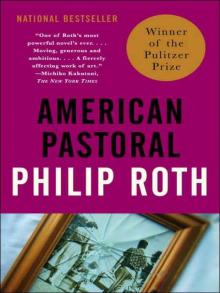 American Pastoral
American Pastoral The plot against America
The plot against America The Human Stain
The Human Stain Nemesis n-4
Nemesis n-4 Sabbath’s Theater
Sabbath’s Theater The Professor of Desire
The Professor of Desire Our Gang
Our Gang The Breast
The Breast Operation Shylock
Operation Shylock The Dying Animal
The Dying Animal Letting Go
Letting Go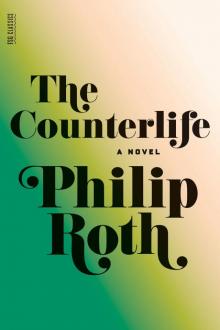 The Counterlife
The Counterlife Everyman
Everyman Nemesis
Nemesis Exit Ghost
Exit Ghost Portnoy's Complaint
Portnoy's Complaint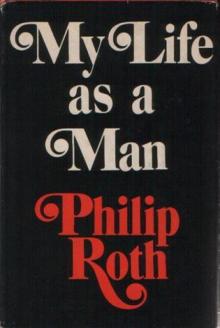 My Life as a Man
My Life as a Man I Married a Communist
I Married a Communist The Anatomy Lesson
The Anatomy Lesson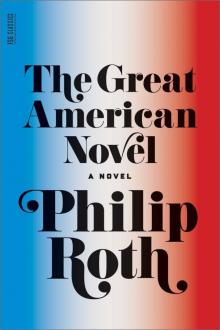 The Great American Novel
The Great American Novel Shop Talk
Shop Talk The Humbling
The Humbling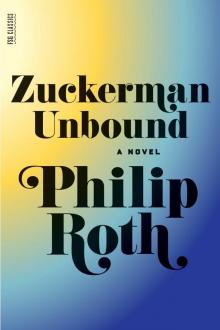 Zuckerman Unbound
Zuckerman Unbound When She Was Good
When She Was Good The Prague Orgy
The Prague Orgy American Pastoral (Nathan Zuckerman)
American Pastoral (Nathan Zuckerman) Goodbye, Columbus
Goodbye, Columbus Reading Myself and Others
Reading Myself and Others